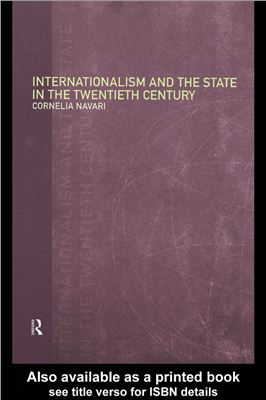Routledge, 2000. 373 p.
During the twentieth century, formal links between govements have become much more intense, reflecting a growing emphasis on inteationalism and the world community. There has been a multi-layered transformation in the relations between states, at both a social and a diplomatic level. This has resulted in, amongst other changes, an increase in the number of inteational organisations and collective security arrangements and an expansion in inteational law. This text examines closely the development of this phenomenon, from its roots before the founding of the League of Nations in 1919 to its present-day forms. Through her analysis of power relations, material changes and developments in ideologies, Coelia Navari provides an accessible and student-friendly historical introduction to the changing relations between states. The subjects which she covers include long-term trends relating to war, the changing balance of power, decolonisation, the European system and the Cold War. This volume is essential reading for all those interested in the history of Inteational Relations in the twentieth century.
The long trends.
Population.
Production and consumption.
Commerce and finance.
Industry.
National self-determination.
War.
The changing balance of power.
State policy.
The changing state.
The interests of the major powers.
The Cold War.
Decolonisation.
Political economy.
The new inteational management.
The new liberalism.
The new diplomacy and the new state.
The mode law of nations.
Public inteational organisation.
Allies and alliances.
The European system.
The revolution of inteationalism.
During the twentieth century, formal links between govements have become much more intense, reflecting a growing emphasis on inteationalism and the world community. There has been a multi-layered transformation in the relations between states, at both a social and a diplomatic level. This has resulted in, amongst other changes, an increase in the number of inteational organisations and collective security arrangements and an expansion in inteational law. This text examines closely the development of this phenomenon, from its roots before the founding of the League of Nations in 1919 to its present-day forms. Through her analysis of power relations, material changes and developments in ideologies, Coelia Navari provides an accessible and student-friendly historical introduction to the changing relations between states. The subjects which she covers include long-term trends relating to war, the changing balance of power, decolonisation, the European system and the Cold War. This volume is essential reading for all those interested in the history of Inteational Relations in the twentieth century.
The long trends.
Population.
Production and consumption.
Commerce and finance.
Industry.
National self-determination.
War.
The changing balance of power.
State policy.
The changing state.
The interests of the major powers.
The Cold War.
Decolonisation.
Political economy.
The new inteational management.
The new liberalism.
The new diplomacy and the new state.
The mode law of nations.
Public inteational organisation.
Allies and alliances.
The European system.
The revolution of inteationalism.

